Australia/Israel Review
Essay: Counter-terrorism from the Inside
Dec 20, 2018 | Jacob Magid
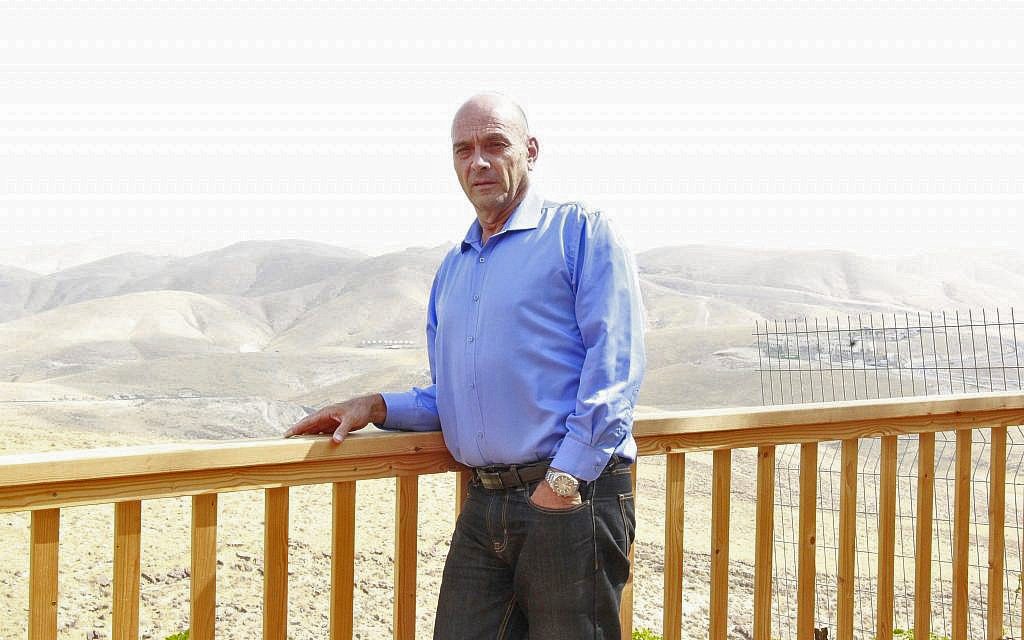
Interview with a former Shin Bet commander
KFAR ADUMIM, West Bank – A group of Palestinian teens in East Jerusalem are in the middle of a soccer game when a Shin Bet agent pulls up to the field, tailed by an army jeep, and signals them to halt.
The scene could well have been mistaken for the start of an altercation – however, Avi Arieli has not called the timeout in order to detain anyone. He simply wants to join the game.
“Ah, Captain,” the youth say, respectfully acknowledging the senior Shin Bet field agent. “Come on in.”
Recalling the incident, which took place decades ago, Arieli acknowledged that his request had shocked the accompanying security officers more than it had the Palestinian teens. “At first, they thought I was crazy, but eventually they got used to my style.”
That “style” is what Arieli says guided him throughout 30 years in the Shin Bet, Israel’s internal security agency, where he climbed the ranks to eventually become the head of the security service’s so-called “Jewish Division,” which combats non-Arab terrorism.
In one of his first interviews since retiring earlier this year, the 60-year-old father-of-six opened up about his experiences grappling with both Arab and Jewish terrorism as well as what he views as the formula to combat them both.
It’s education, stupid
Sitting in his living room in the Kfar Adumim settlement, Arieli summarised the doctrine: “It’s about preventing terrorism before it even grows.”
To illustrate what he meant, Arieli described a scenario in which a soldier sees an armed terrorist charging at him from the other side of a border fence.
“At this point, there are only two ways in which the incident can unfold: either the soldier shoots the terrorist or the terrorist shoots the soldier,” he said.
“But the prevention I’m talking about takes place well before the terrorist reaches that fence. My goal is to steer him from gaining the motivation to carry out the attack in the first place.”
In order to achieve this, Arieli argues that it all boils down to one factor: education. “Education brings security,” he asserted.
In the case of the soccer game, the former Shin Bet official explained that his entry onto the field provided an opportunity for him to teach an informal lesson of sorts.
“After playing for a bit, we naturally get to talking. I hear about their struggles, and in between, I’m able to caution them against offences such as stone throwing,” he said, adding that these conversations allow the teens to see him as a human being rather than “the enemy”.
While Arieli acknowledged that exposing himself as a Shin Bet agent in the middle of a Palestinian village put him at risk, he explains that it was done “in the hope that my presence might positively influence at least one person there.”
With his cleanly shaved head, calm but forceful tone and the remarkable ability to make it through a four-hour conversation without breaking a single smile, Arieli carries the demeanour of your stereotypical Israeli security official. But his background is anything but.
Unlike most recruits, he did not arrive at the agency immediately after his army discharge. Arieli first spent seven years teaching at Jerusalem’s Himmelfarb high school, where he quickly became the youngest assistant principal at the prestigious religious academy.
“Not a single student was thrown out during my tenure,” he boasted, highlighting another aspect of the educational philosophy he brought with him to the Shin Bet.
While Arieli admitted that the Palestinians with whom he interacted as a field agent beyond the Green Line were first and foremost perceived as potential combatants, “they also became my students to a certain degree.”
And to the former teacher, that meant that they too could not be neglected.
This was what brought Arieli to join Palestinian youth on the soccer field, smoke hookah with them in cafes and visit their parents’ homes to check in on their well-being.
While that drive may have made him a natural fit for the Shin Bet, Arieli hadn’t considered service in the security establishment until after the first Intifada broke out in 1987. It was then that he met with a friend in the agency who recommended that he apply.
“The Shin Bet is a civilian organisation, not a military one. You need to be able to look at life through your eyes, not through the lens of a weapon, as those coming straight out of the army often only know how to do,” he explained.
Arieli passed through the various interview stages and was offered a position. However, he conditioned his acceptance on being allowed to return home every night during the year-and-a-half of training to be with his young family.
Evidently impressed by his gall, the agency agreed and Arieli began his Shin Bet service in mid-1988 with intensive courses in Arabic and Middle Eastern studies.
Getting Palestinians ‘to betray their side’
A separate part of his training focused on the recruitment of informants. Arieli divulged details about the delicate process, explaining that “it can only be done through persuasion, not by threats or force.”
He flatly rejected claims that the Shin Bet threatens to disclose the sexual orientation of closeted Palestinians who do not agree to work as informants for the agency.
“If I threaten a prospective informant, I know that from that very moment he’s already planning how to betray me,” Arieli explained. “I want someone who is willing to risk his life for me and my country, not the other way around.”
He said that extensive time in the field getting to know the various dynamics and political affiliations of the communities in his region of responsibility prepared him to make informed decisions regarding which residents could be trusted as informants.
These individuals are then enticed with “incentives” such as money, employment or medical help. However, Arieli stressed that such perks on their own are never enough to convince someone to “betray his own side.”
“If I don’t also invest in my informant’s character and well-being, I am setting myself up to get burned.”
“You must treat them with respect. Some of my informants became very good friends of mine,” he said candidly.
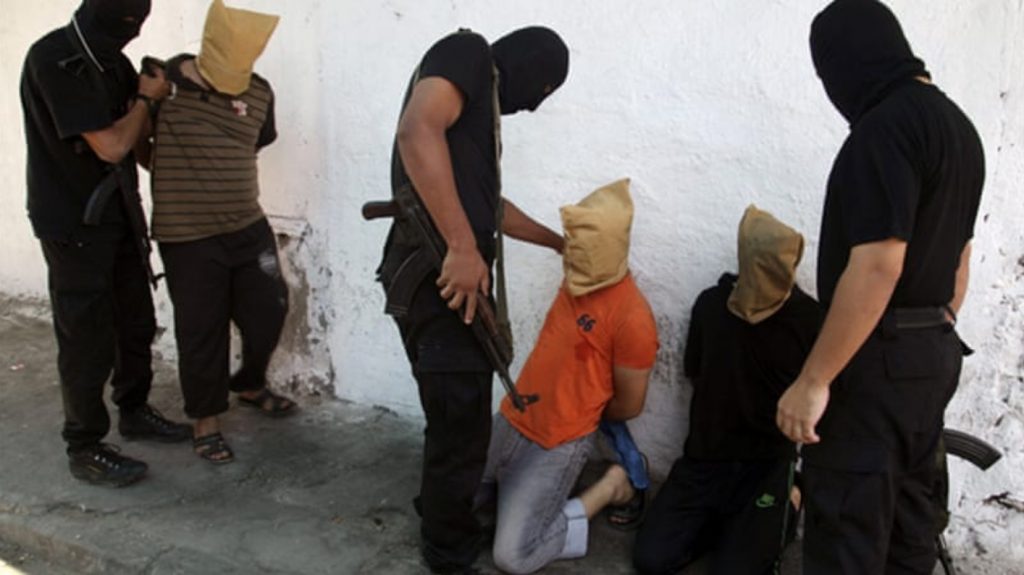
Hundreds of Palestinians have been murdered as suspected Israeli informants
Arieli recognised the degree of risk being taken by the Palestinians he recruited.
During the first Intifada, hundreds of Palestinians were murdered based on the suspicion that they collaborated with Israel. “The vast majority of them did not,” he insisted.
But one of Arieli’s own informants was among those killed upon being exposed. “It hurts because you develop a connection with your informant. Regardless of the age difference, he becomes like a child for whom you’re responsible.”
‘A normal life’
Arieli spent nearly two decades as a field agent in east Jerusalem and the West Bank. During that period, fellow agents and friends Chaim Nachmani and Noam Cohen were killed by their respective informants in 1993 and 1994 – incidents that he said impacted him profoundly.
The former Shin Bet official divulged that while he had never been in direct physical danger, he had been threatened.
After the kidnapping of Nachshon Wachsman by Hamas terrorists in 1994, Israeli security forces carried out a failed attempt to rescue him in which they inadvertently tipped off the captors of the 19-year-old IDF sergeant, who was shot dead before special forces could reach him.
Three Hamas operatives were also killed in the botched recovery and in response, the terror group put a price on the head of Arieli, who they thought had been responsible for determining the location where Wachsman was being held.
“They were mistaken. I do not deserve the credit for that, but they called for my murder nonetheless,” he said.
Asked how his family handled his service, Arieli acknowledged that the long hours away from home likely took a toll.
“They would see me at home making kiddush (blessing the wine) on Friday night and then all of a sudden getting a phone call and having to leave.”
“While it may have been challenging, the job came with an ample salary and an opportunity to give back to the country, so it was a little surprising that none of my kids expressed interest in following my footsteps,” he reflected.
Arieli recalled asking them why that was toward the end of his service. He was told that they wanted to raise their own children in “normal homes where both parents are around.”
“At that point I understood that my children had been forced to grow up in a home that was not ‘normal,’” he said, somewhat dejectedly. “I don’t regret the path I took. I understand how many lives I was able to save, but I am also aware of the costs.”
‘Most traumatic event in Jewish history since the Holocaust’
For over half a decade, Arieli had immersed himself “deep in the Arab world” as part of his efforts to thwart what he had understood to be the primary threat to Israelis – Palestinian terror.
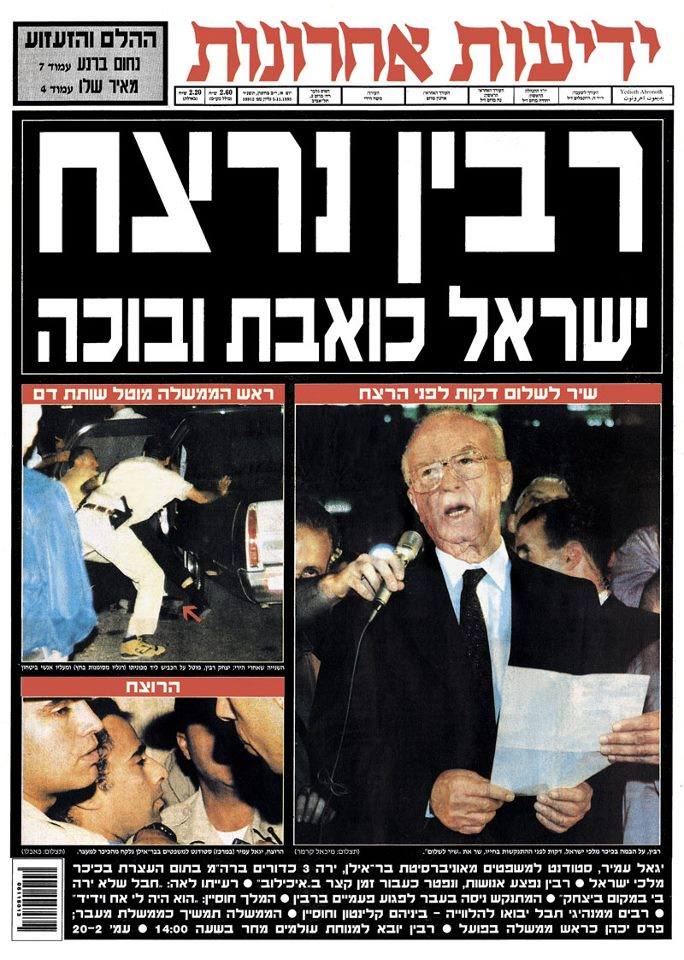
The shocking 1995 murder of PM Yitzhak Rabin transformed Arieli’s career
But with the assassination of prime minister Yitzhak Rabin by Jewish extremist Yigal Amir, that perception was turned completely on its head.
Arieli described first learning of the November 4, 1995 murder: “I had been sitting in my living room watching the Saturday night news – something I never do – when they suddenly announced that Rabin had been assassinated.”
“I immediately began crying like a baby. I couldn’t control my tears,” he said. “I called for everyone in the house to come down. I kept yelling repeatedly, ‘Look at what’s happened!’”
Removing the Holocaust from the equation, he referred to the assassination as the most traumatic incident in the last 2,000 years of Jewish history.
“A Jew murdered a prime minister who was democratically elected by citizens of the Jewish state. It was a strike not just at the man, but also at the democracy,” he asserted.
The next day, Arieli arrived at work and asked to be transferred to the “non-Arab terror unit”, more colloquially known as the Jewish Division.
However, his superiors had other ideas and kept Arieli working on Palestinian terror. In 2000, he was promoted to command all Shin Bet personnel in the Jerusalem area, going on to secure then-prime minister Ariel Sharon’s visit to the Temple Mount prior to the second Intifada.
Stripping the terrorists of their supporters
Nine years later, Arieli’s demand from the morning after the assassination was finally met and he was promoted to head the Jewish Division.
“Upon my appointment, I began to carry out – at a radical pace – my philosophy to prevent terrorism,” he said.
This meant meeting with hundreds of community leaders – from teachers to rabbis to municipal council chairs – encouraging them to do everything in their power to prevent their youth from dropping out of school and moving to the West Bank hilltops.
While Arieli clarified that the unit’s focus is not exclusively on Jewish terror and that Jewish terror is not solely perpetrated by religious extremists, the conversation tended to circle back to that latter group, some of whom are more commonly known as “hilltop youth” due to their locale in outposts beyond the Green Line.
Arieli explained that for all of the headache these young Israelis cause the security establishment, they number around just 100 in total.
Yet the former Shin Bet official argued that the “Price Tag” hate crime attacks that they carry out against Palestinians and their property – purportedly in retaliation for violence against Israelis or government policies perceived as hostile to the settler movement – carry the potential of spiralling Israel into war.
To prevent such a scenario, Arieli set out to meet with “as many community leaders as [he] could.”
The purpose of these meetings, he explained, was to distance the handful of radicals from their supporters.
To illustrate what he meant, Arieli raised an open hand in the air and tugged at the tip of his pinky. “Here you have the terrorists,” he said asserting that they were a very small minority.
“A terrorist cannot continue to function without support,” he argued. “If I move these various groups further away from them, then the extremists, likewise, will distance themselves from terrorism.”
Keeping in line with his philosophy of investing most in troubled youth, he said he aggressively lobbied West Bank council chairmen to hook up the illegal outposts with running water and to have social workers pay regular visits to the hilltops.
Arguing that they should not be responsible for these runaway youth, the municipal leaders would often push back against Arieli’s requests.
“I’d explain to them that if you don’t provide them water, they’re going to go and steal it from other communities. And by sending social workers, they might be able to get a number of those youth back in school.”
He clarified that an ideal situation would see the government demolish every single illegal outpost.
The lack of enforcement against illegal construction creates an environment of anarchy that breeds further lawlessness and extremism, he argued.
Devoted ideologues or troubled youth?
While Arieli said that just about every community leader he met with was receptive to his message, that was less the case with the very hilltop youth he sought to redeem.
He pointed to the metal fence that surrounds his entire home. It was installed, along with a number of security cameras, not during his time working with Palestinians, but rather when he began working with fellow Jews. Far-right activists leaked Arieli’s identity during his first week as Jewish Division head and from then on, his home was periodically targeted. While the incidents did not extend beyond property damage to his home and car, they were enough to require the expansion of the Kfar Adumim resident’s security detail.
In 2010, Jewish extremists graffitied Arieli’s name on a mosque that they torched in a Price Tag attack in the northern West Bank. “When they write my name there, Hamas sees it and starts looking into me,” the former Shin Bet commander said, reflecting on the calculated nature of such offences.
But Arieli explained that he used the exposure to his advantage. “When I met with rabbis and teachers, they knew I could go toe-to-toe with them in educational debates because I was coming at the issue from the same angle as they were.”
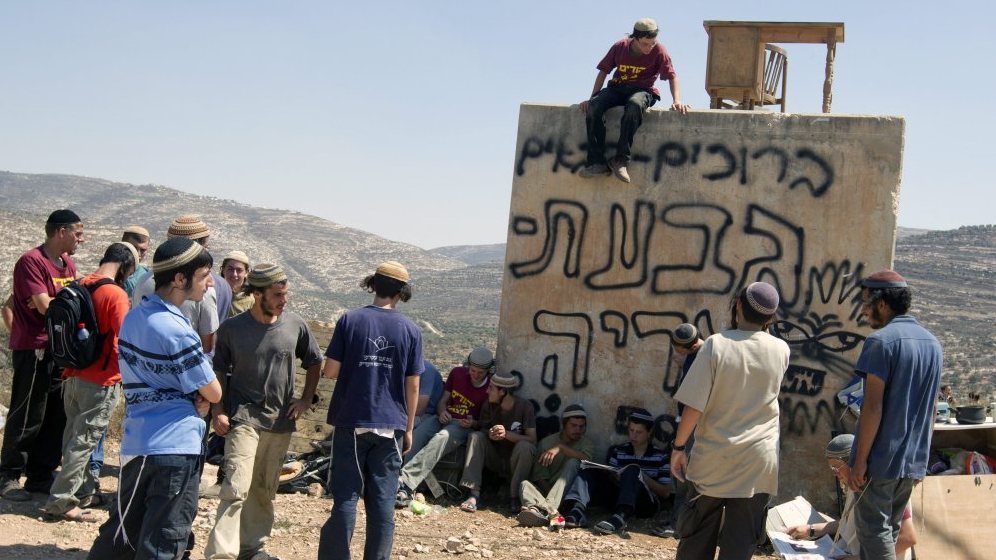
“Hilltop Youth” Jewish extremists: More troubled teens than ideologues, Arieli believes
He categorically rejected the argument he sometimes heard from these religious educators that the hilltop youth deserve to be treated as ideological activists rather than troubled teenagers.
“They speak about ideology, but the passion that’s driving them is coming from other places – from broken homes and from being tossed out of school,” Arieli argued.
As for the legitimacy of working to establish new points of Jewish settlement throughout the West Bank, the Kfar Adumim resident was dismissive. “Why do you need to build new communities? There are hundreds of them as is.”
He said that sex – “not out of love” – and drugs are endemic in the outposts established by the hilltop youth.
“None of them are waking up at sunrise to put on phylacteries and pray,” Arieli said, rejecting the notion that the youth on the hilltops with their payis (long sidelocks) and tzitzit (ritual fringes) are any more religious than those in established yeshivas (Jewish religious academies).
Arieli recalled once paying a visit to an outpost and coming across a young boy around 12-years-old who was smoking a cigarette at the entrance.
“I asked him why he was smoking at such a young age. He bluntly responded, ‘cuz,’ and looked away.”
“These are the kids we’re dealing with. It’s not some grand ideology,” Arieli stressed.
He admitted having received more respect in visits to Arab towns than he did during his trips to Jewish outposts. “When a Shin Bet agent drops by a Palestinian village, the residents view it as the State of Israel coming to them. But when I go to the outposts, there is no respect shown because they don’t believe in the legitimacy of the State of Israel or the Shin Bet.”
Despite the pushback he received throughout his three-and-a-half years as Jewish Division head, Arieli claimed to have succeeded in his most important objective: not a single Palestinian was killed during his tenure.
He acknowledged that “Price Tag” attackers had managed to damage Palestinian property during his term, but said his philosophy of viewing security through the lens of education prevented more serious attacks.
Then came Duma
After completing his tenure as Jewish Division chief in 2013, Arieli took two years off to study law before going on to serve as the Shin Bet’s diplomatic representative in Washington for three years.
During that period, however, one of the most deadly incidents of Jewish terrorism unfolded. In July 2015, a mother, father and their infant child were burned to death after their home in the Palestinian village of Duma was firebombed in the middle of the night.
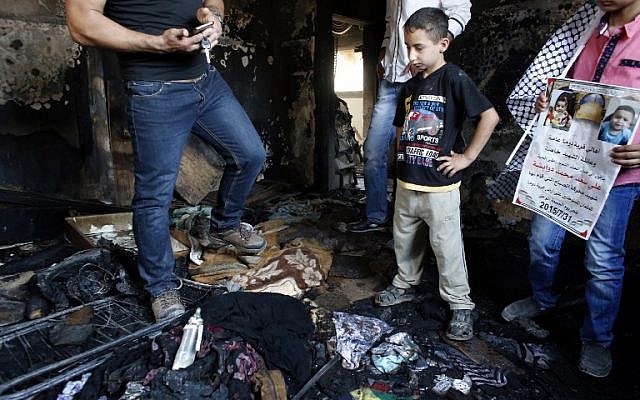
A house in the West Bank village of Duma set on fire in an apparent attack by Jewish terrorists in July 2015, killing 18-month-old Palestinian toddler Ali Saad Dawabsha and his parents
Amiram Ben-Uliel, 21, was charged with the murder of Ali Saad Dawabsha and his parents, Riham and Saad Dawabsha. A second far-right activist was also indicted as an accomplice, but his name has remained under gag as he was a minor at the time of the attack.
The case against the pair is ongoing, and in July the Central District Court ordered the alleged accomplice be released to house arrest. The decision came a month after the court threw out several confessions tying the now 19-year-old to the attack, because they were extracted under extreme duress by Shin Bet interrogators.
“In a democracy, it’s good that the courts are the ones to decide,” Arieli said, accepting the conclusion drawn by the panel of judges. However, he added that he stood by the Shin Bet’s methods and was confident that if enhanced interrogation was employed then it must have been necessary.
“Sometimes the Shin Bet has a lot more intelligence that can tie someone to a crime, but the proof that can be used in court is not there.”
Arieli said that if the agency deemed that these individuals pose a continued danger to society, it would use extreme measures such as administrative detentions to keep them locked up. But as long as that is not the case, they are allowed to roam free.
Arieli refrained from placing blame on his successor for the Duma attack, but acknowledged that the Jewish Division did not continue employing his philosophy on combating terrorism to the same extent to which he had.
Still teaching
Last March, Arieli officially retired from the Shin Bet after 30 years of service. However, his work in education has continued, as he teaches courses on the strategic threats to Israel at pre-military programs throughout the country.
“People assume I come to speak about Iran, Hamas and terrorism,” but Arieli states that he’s far more concerned by the rifts that have developed within Israeli society as well as between the Jewish state and the Diaspora.
The antidotes to the threat of Israel’s internal divisions, according to the former Shin Bet official, are those pre-military programs where he now teaches. With dozens of programs throughout the country, he lauded their ability to bring together Israelis from all sectors, giving them the opportunity to better understand one another.
Arieli is also among a small team of educators working to create an Israeli “centre for leadership” where Jewish and non-Jewish university students from around the world will come and study with the young Israeli pre-military academy participants.
“Think about what this can contribute to us and what we can contribute to the broader world,” he said excitedly. “A real light unto the nations!”
© Times of Israel (www.timesofisrael.com), reprinted by permission, all rights reserved.
Tags: Israel, Palestinians, Terrorism






